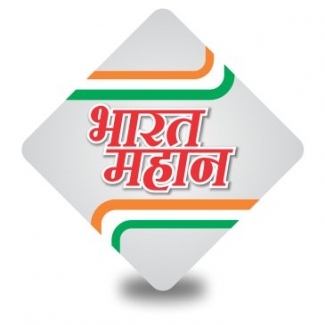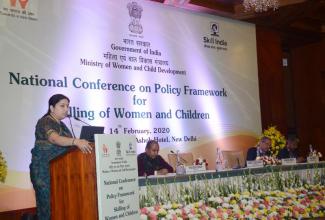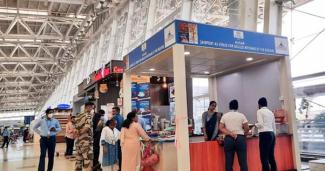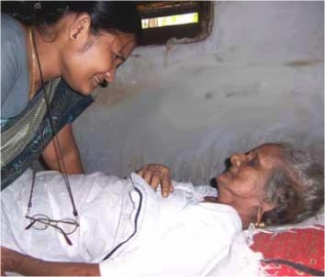
Union Minister of Textiles, Smriti Zubin Irani, launched four projects in North East for the development of silk sector through video conference in New Delhi today. She inaugurated Muga silk seed production centre in Tura, Meghalaya, silk printing and processing unit in Agartala, Tripura, Eri spun silk mill in Sangaipat, Imphal and development of sericulture in Mamit, Mizoram. The Minister also inaugurated new office building of Weavers Service Centres (WSC) in Indore, Madhya Pradesh and Kannur, Kerala. She interacted with the people’s representatives, officials and farmers and urged them to generate awareness among the farmers and weavers about loan schemes available under MUDRA YOJANA and recently announced income support programme for farmers – PM Kisan and pension scheme for workers in unorganized sector- Pradhan Mantri Sram Yogi Mandhan Yojna.
Muga Silkworm Seed Production Centre (SSPC), Tura, Meghalaya is one of the projects taken up directly by Centre Silk Board(CSB) for implementation under Integrated Sericulture Development Project (ISDP) of NERTPS for creation of seed infrastructure units in NE States. The infrastructure facilities available presently with the State are insufficient to meet the demand of required quantity of Muga basic seed.The creation of additional Muga SSPC in Tura will strengthen the Muga seed sector to make the State self-sufficient for production and supply of Muga silkworm seed. The seed production capacity of the unit is one lakh commercial dfls per year and around 300 farmers will be covered directly.
Silk Printing & Processing unitin Agartala, Tripura has been setup at a total project cost of Rs.3.71 crore for production, printing and processing of 1.5 lakh meter silk per annum.The project has been implemented directly by the state in coordination with CSBand is ready to commence production process. Textiles printing is a process in which designs are printed on the textiles material using various methods and techniques and done on finished fabrics. These printed fabrics are used for sarees,dress materials, home furnishings and upholstery. Most of the fabrics produced on handlooms and powerlooms in Tripura are sent to Kolkata, Bengaluru, Bhagalpur and other places for value addition by processing and printing. This unit will lead to higher and sustainable growth in the entire textile value chain from fiber to finished products in the State and improve the local weaver artisans.
Eri Spun Silk Millin Sangaipat, Imphal East, Manipur was approved with a total project cost of Rs.21.53 crore was approved in September 2018and will be implemented directly by the State in co-coordination with CSB.Around 65% of Eri cocoons produced in Manipur are converted into yarn within the State through conventional spinning device Takli, Pedal operated and Motorised Eri Spinning machines. The rest of around 35% of Eri cocoons is marketed outside the statewithout value addition resulting in less income to farmers.
The installed production capacity of Mill is 55 MT of quality Eri spun silk yarn by consuming about 74 MT of Eri cocoons per annum. The expected turnover at installed capacity utilization of 80% during the 1st year is around Rs.10.00 crore with a net profit of Rs.3.00 crore. The project is expected to generate direct employment to 107 persons throughout the year and indirect employment to around 1,500 Eri farmers through the backward linkage and around 730 weavers through forward linkage.
The project for development of sericulture in the aspirational district of Mamit, Mizoram, was approved with a total cost of Rs.11.56 crore, which includes Government of India share of Rs.10.82 crore. The project will be implemented directly by the statein co-coordination with CSB.Mamit is one of the aspirational districtsidentified by NITI Aayog for overall development from 2018-19 onwards. This includes 14 districts in NE region covering all 8 NE States.
The project is for development of Eri culture in Mizoram which will focus on creation of pre & post cocoon activities linkage from raising of silkworm food plant, rearing house, silkworm rearing activities, spinning, weaving along with capacity building. It will also help the tribal people by providing employment as well as increase productivity along with high quality cocoons, yarns and quality finished products. The project covers 684 beneficiaries and would generate employment of 3,250 man-year.It is estimated that established Eri plantation of 500 acres (400 acres new plantation and 100 acres existing plantation) will earn revenue of around Rs.60,000/- to 70,000/- per acre/annum depending upon the cocoon rates and including the selling of pupae.
WSC, Kannur was established in 1972 and was functioning from hired premises. Construction work commenced in October, 2016 and has been completed in February, 2019 at a total cost of Rs.228.53 lakh.










